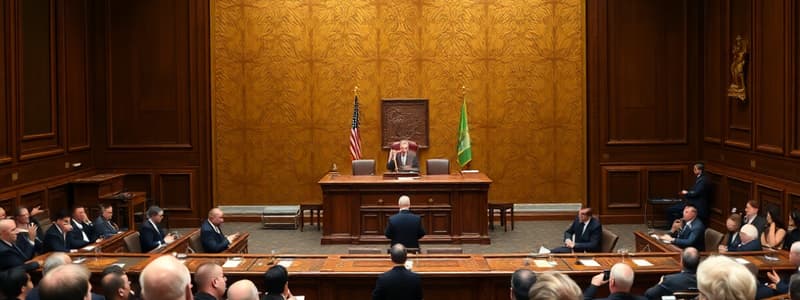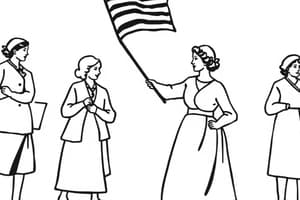Podcast
Questions and Answers
What was the primary accusation against President Bill Clinton during his impeachment?
What was the primary accusation against President Bill Clinton during his impeachment?
- Corruption in office
- Misuse of government funds
- Violation of electoral laws
- Perjury and obstruction of justice (correct)
Which of the following best describes the political motivations behind the impeachment of Dilma Rousseff?
Which of the following best describes the political motivations behind the impeachment of Dilma Rousseff?
- Charges of campaign fraud during the 2014 elections
- Misappropriation of funds from government projects
- Accusations of employing common accounting practices (correct)
- A reaction to a major scandal involving foreign affairs
What distinguishes impeachment from a vote of no-confidence in theory?
What distinguishes impeachment from a vote of no-confidence in theory?
- Impeachment is used only in presidential systems, no-confidence in parliamentary systems
- Impeachment is a political maneuver, whereas no-confidence is legal
- Impeachment relates to public opinion while no-confidence does not
- Impeachment embodies legal matters while no-confidence reflects political relationships (correct)
Which aspect did critics highlight about the motivations behind both Clinton's and Rousseff's impeachments?
Which aspect did critics highlight about the motivations behind both Clinton's and Rousseff's impeachments?
Following Dilma Rousseff's impeachment, who replaced her in office?
Following Dilma Rousseff's impeachment, who replaced her in office?
What is a significant characteristic of a parliamentary form of government?
What is a significant characteristic of a parliamentary form of government?
How does impeachment differ from a vote of no-confidence?
How does impeachment differ from a vote of no-confidence?
What can lead to a vote of no-confidence against a Prime Minister?
What can lead to a vote of no-confidence against a Prime Minister?
Which statement about impeachment in the United States is true?
Which statement about impeachment in the United States is true?
In the context of political removal, what does a vote of no-confidence signify?
In the context of political removal, what does a vote of no-confidence signify?
Why is impeachment not considered a political instrument?
Why is impeachment not considered a political instrument?
What kind of factors can trigger a vote of no-confidence?
What kind of factors can trigger a vote of no-confidence?
What outcome occurs if a vote of no-confidence is successful?
What outcome occurs if a vote of no-confidence is successful?
Flashcards
Impeachment
Impeachment
A legal process in which a political leader is accused of serious wrongdoing and is removed from office.
Vote of No Confidence
Vote of No Confidence
A vote in Parliament where members express their lack of confidence in the government, which can lead to the government's resignation.
Politically Motivated Impeachment
Politically Motivated Impeachment
A situation where a leader is accused of a less serious wrongdoing, and the process is primarily focused on removing the leader from office based on political differences.
Separation of Powers
Separation of Powers
Signup and view all the flashcards
Parliamentary Democracy
Parliamentary Democracy
Signup and view all the flashcards
Confidence Relationship
Confidence Relationship
Signup and view all the flashcards
Legislature's Impeachment Power
Legislature's Impeachment Power
Signup and view all the flashcards
Vote of No Confidence vs. Impeachment: Context
Vote of No Confidence vs. Impeachment: Context
Signup and view all the flashcards
Impeachment and the Supreme Court
Impeachment and the Supreme Court
Signup and view all the flashcards
Political Influence on Impeachment
Political Influence on Impeachment
Signup and view all the flashcards
Vote of No-Confidence and Impeachment: Similarities and Differences
Vote of No-Confidence and Impeachment: Similarities and Differences
Signup and view all the flashcards
Study Notes
Parliamentary vs. Presidential Systems
- Vote of no-confidence and impeachment processes differ based on Presidential vs. Parliamentary systems.
- Parliamentary systems feature a confidence relationship between the Prime Minister and Parliament.
- A vote of no confidence, if lost, can result in a change of leadership.
- Presidential systems have no such direct accountability to the legislature.
- Impeachment is a formal process for removing a government official (like a President) for misconduct.
Vote of No Confidence
- A political instrument for removing a Prime Minister due to perceived inability to lead.
- Reasons for a vote vary; examples include leadership controversies (Boris Johnson) or perceived election campaign ineffectiveness (Rishi Sunak).
Impeachment
- A legal instrument for removing officials deemed guilty of unlawful behavior, misconduct, or abuse of power.
- In the US, this is a legislative process (Congress), not judicial (Supreme Court).
- Impeachment's success results in the removal of the official.
- Can potentially be politically motivated.
- Examples:
- Bill Clinton's impeachment (1998-99): Accusations of perjury and obstruction of justice relating to the Monica Lewinsky affair. The affair and his cover-up were viewed as a breach of trust.
- Dilma Rousseff's impeachment (2016): Accusation of using accounting tricks to hide budget deficits. The act, while apparently not illegal and common in past presidents, was deemed politically motivated.
Key Differences Summarized
- Vote of no confidence, fundamentally political, reflects the legislative confidence in the Executive.
- Impeachment, legally based, represents the separation of power between the Executive and the Legislature for removal based on misconduct.
- In practice, both processes are often politically charged.
Studying That Suits You
Use AI to generate personalized quizzes and flashcards to suit your learning preferences.




